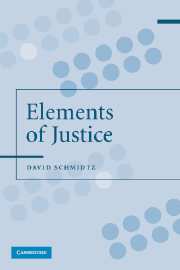Book contents
- Frontmatter
- Contents
- Acknowledgments
- PART 1 WHAT IS JUSTICE?
- PART 2 HOW TO DESERVE
- PART 3 HOW TO RECIPROCATE
- PART 4 EQUAL RESPECT AND EQUAL SHARES
- PART 5 MEDITATIONS ON NEED
- 25 Need
- 26 Hierarchies of Need
- 27 Need as a Distributive Principle
- 28 Beyond the Numbers
- 29 What Do We Need?
- PART 6 THE RIGHT TO DISTRIBUTE
- References
- Index
26 - Hierarchies of Need
Published online by Cambridge University Press: 05 June 2012
- Frontmatter
- Contents
- Acknowledgments
- PART 1 WHAT IS JUSTICE?
- PART 2 HOW TO DESERVE
- PART 3 HOW TO RECIPROCATE
- PART 4 EQUAL RESPECT AND EQUAL SHARES
- PART 5 MEDITATIONS ON NEED
- 25 Need
- 26 Hierarchies of Need
- 27 Need as a Distributive Principle
- 28 Beyond the Numbers
- 29 What Do We Need?
- PART 6 THE RIGHT TO DISTRIBUTE
- References
- Index
Summary
Thesis: When we ask what makes one society better than another, there is no reason to work with anything less than the most expansive conception of need: the whole spectrum of human flourishing.
NEEDS VERSUS NEED-CLAIMS
Suppose Michelangelo reaches a delicate stage in his sculpting. Turning to his assistant, he says, “I need the small chisel.” His assistant replies, “Do you really need the small chisel?”
What is the assistant's point? (1) We can imagine the assistant not fathoming Michelangelo's purpose, yet the context makes it obvious: Michelangelo needs the chisel to continue his work. (2) We can imagine the assistant grasping Michelangelo's purpose, but doubting that the small chisel is apt for that purpose. If that were the case, though, the assistant would not have emphasized the word “need.” She would have said something like, “Are you sure you need the small chisel?” (3) We can imagine Michelangelo's assistant being at a bad juncture in her philosophical training, playing word games, having developed the skill to make fine distinctions between needs and wants, but not yet having the wisdom to know the point of fine distinctions. Or (4) we can, just barely, imagine the assistant thinking Michelangelo is claiming to be entitled to a chisel according to a principle of need-based distribution.
- Type
- Chapter
- Information
- The Elements of Justice , pp. 163 - 165Publisher: Cambridge University PressPrint publication year: 2006



